African American Families Today
African American Families Today
Myths and Realities
Angela J. Hattery and Earl Smith
ROWMAN & LITTLEFIELD PUBLISHERS, INC.
Lanham Boulder New York Toronto Plymouth, UK
Published by Rowman & Littlefield Publishers, Inc.
A wholly owned subsidiary of The Rowman & Littlefield Publishing Group, Inc.
4501 Forbes Boulevard, Suite 200, Lanham, Maryland 20706
www.rowman.com
10 Thornbury Road, Plymouth PL6 7PP, United Kingdom
Copyright 2012 by Rowman & Littlefield Publishers, Inc.
All rights reserved . No part of this book may be reproduced in any form or by any electronic or mechanical means, including information storage and retrieval systems, without written permission from the publisher, except by a reviewer who may quote passages in a review.
British Library Cataloguing in Publication Information Available
Library of Congress Cataloging-in-Publication Data
Hattery, Angela J., 1966
African American families today : myths and realities / Earl Smith and Angela Hattery
p. cm.
Includes bibliographical references.
ISBN 978-1-4422-1396-8 (cloth : alk. paper) ISBN 978-1-4422-1398-2 (ebook)
1. African American families. 2. African AmericansSocial conditions1975
3. United StatesRace relations. I. Smith, Earl. II. Title.
E185.86.S637 2012
305.896'073dc23
2012028669
 The paper used in this publication meets the minimum requirements of American National Standard for Information SciencesPermanence of Paper for Printed Library Materials, ANSI/NISO Z39.48-1992.
The paper used in this publication meets the minimum requirements of American National Standard for Information SciencesPermanence of Paper for Printed Library Materials, ANSI/NISO Z39.48-1992.
Printed in the United States of America
Acknowledgments
The United States enters the twenty-first century with regards to politics, the banking crisis, family formationespecially for gay and lesbian partnersto the ongoing debates on the election of Barack Obama as the first African American in the White House, and each issue proves to be fascinating.
Among others, we highlight some of the key issues leading into the 2012 presidential election. The debate around marriage equality; several states have passed legislation in favor of same-sex marriage, and others, most recently North Carolina voted to affirm and limit marriage to a contract between one man and one woman. Also are the debates over high unemployment and the widening wealth gap between whites and nonwhites.
As any author knows, finding ways to create even-handed discussions and debates on these issues in the framework of a bookand especially a book built around hot button topicsrequires help.
In this acknowledgment we thank all of the thinkers, debaters, authors, friends, research assistants, and each other as we traveled the road of thinking about, researching, writing (and rewriting) African American Families Today: Myths and Realities.
Without colleagues and friends, who we read, discuss ideas with, agree with and at times disagree with, the ideas set forth here would not have been written. Listing the names of some and not others would be a tragedy so we will just say thank you .
To Angela another project, another book. This book is different by entering the fray of public sociology where plain language and telling it like it is, helps us to understand the contemporary US political economy that impacts the life chances of all citizens (and others). The way we did this also allows us to examine specifically the issues and controversies that affect African Americans life chances on a daily basis. Thanks for partnering in this adventure!
To Earl In many ways this book feels like the compilation and refining of the issues we talk about and debate during our daily, early morning walks. What fun it has been to be able to take issues that seem either really simple or overly complex and work through them to expose what lies beneath. The claim that women will soon dominate the labor market is one of those issues that is more complex and the mass incarceration is one of those issues that is far both more complex and more nuanced. What a privilege to share our daily conversations with a wider reading audience. Thanks for always pushing me to think outside the box! Our partnership is a true pleasure and privilege.
Introduction
Was slavery an idyllic world of stable families headed by married parents? The recent controversy over The Marriage Vow, a document endorsed by the 2012 Republican presidential candidates Michele Bachmann and Rick Santorum, might seem like just another example of how racial politics and historical ignorance are perennial features of the election cycle. The vow, which included the assertion that a child born into slavery in 1860 was more likely to be raised by his mother and father in a two-parent household than was an African American baby born after the election of the USAs first African American President, was amended after the outrage it stirred. However, this was not a harmless gaffe.

African American Families Today examines the myths and realities of African American family life and provides the reader with a critical examination of contemporary life chances for African Americans. It is essential in that we ask hard questions and examine facts rather than rely simply on perceptions to interrogate the often-heard assertion that the election of the first African American president of the United States has dramatically improved the lives of African Americans and their families.
We begin, in the introduction, by outlining the structure of the book, which we have chosen as a deliberate mechanism designed to impart a sociological analysis of the current state of African American families in a manner that is accessible to the nonsociologically trained student of the question. In short, our analytical strategy is to begin each chapter with a popularly held myth about an aspect of African American families. We then devote the bulk of the chapter to debunking the myth, using scientifically derived evidence that is presented in a way that is easily accessible. We provide the sources of these data not only to satisfy our critics, but because our greater aim is to distill the mystery of much of the sociological research and jargon so that the interested reader can go directly to the source and decide for him- or herself whether the myth is grounded in reality or not. As far as our credentials for writing this book and offering this challenge to readers, both the authors hold doctorates in sociology and have authored seven other books together, another four or five books between them, and dozens of peer-reviewed articles and book chapters.
Next we provide a brief overview and examination of the state of African American families today, during the term of the first African American president of the United States. Along the way we introduce the concept of a postracial society as well as discuss the ways in which scientific knowledge is generated and evaluated and how it will be used in this book.
The Concept of a Postracial America
A great deal of scholarship as well as political rhetoric focused on the effects of the election of Barack Obama on our country, on African Americans in our country, and on whites and other racial or ethnic groups. The assumption is typically that Obamas election is indicative of such a deep transformation that it signals or allows for a boundary crossing, passing out of the painful history of slavery and Jim Crow segregation into what many term a postracial America. And, though this debate is not the central focus of our book, it is the framework that shapes both the book but also many of the myths that we use to investigate the state of African American families, and thus it is critical to engage this concept briefly here and throughout the text.

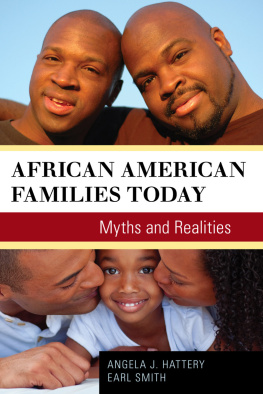
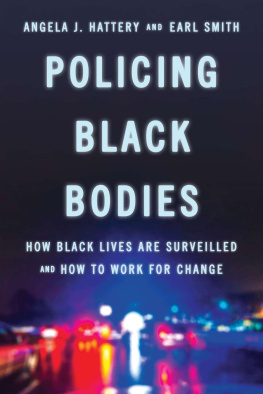
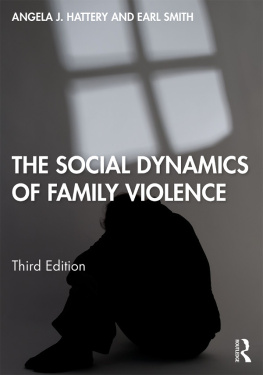

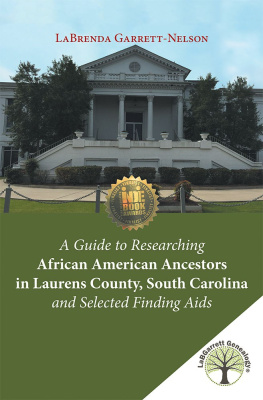
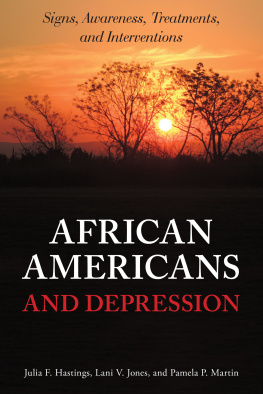
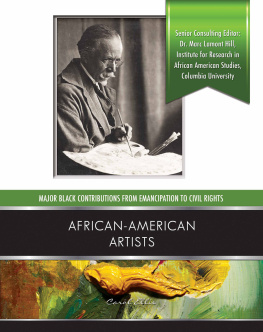
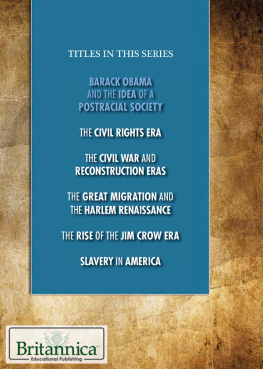
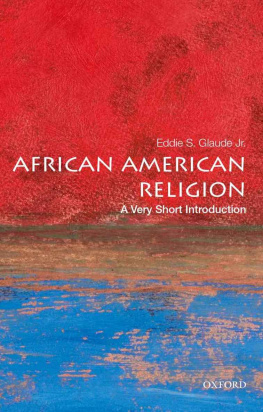
 The paper used in this publication meets the minimum requirements of American National Standard for Information SciencesPermanence of Paper for Printed Library Materials, ANSI/NISO Z39.48-1992.
The paper used in this publication meets the minimum requirements of American National Standard for Information SciencesPermanence of Paper for Printed Library Materials, ANSI/NISO Z39.48-1992.